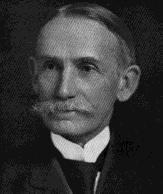 American neo-classical economist and one of the leading figures of the Marginalist Revolution. After graduating from Amherst College in 1875, John Bates Clark traveled to Germany, where he studied under Karl Knies in Heidelberg. Upon his return to the United States, Clark taught economics, history and a whole series of other subjects at Carleton, Smith and Amherst colleges before coming into contact with graduate students at Johns Hopkins. In 1895, Clark finally achieved a perch at Columbia University.
American neo-classical economist and one of the leading figures of the Marginalist Revolution. After graduating from Amherst College in 1875, John Bates Clark traveled to Germany, where he studied under Karl Knies in Heidelberg. Upon his return to the United States, Clark taught economics, history and a whole series of other subjects at Carleton, Smith and Amherst colleges before coming into contact with graduate students at Johns Hopkins. In 1895, Clark finally achieved a perch at Columbia University.
John Bates Clark is best known for developing the “marginal productivity” concept and the ‘product exhaustion’ thesis behind the marginal productivity theory of distribution, which he was (arguably) the first to develop in 1889, from which he then extrapolated enormous ethical conclusions (esp. in his famous 1899 tome). He also developed the theory of marginal utility-based demand independently in 1885, but that was already a bit too late.
Clark was Eugen von Böhm-Bawerk’s great opponent in an early ‘capital controversy’, pitting the Austrian theory of capital against Clark’s own theory, where he proposed that there was a ‘permanent’ fund of capital which entered into a production function like any other factor (this theory was given firmer grounding in his later 1907 Essentials, where he developed his dynamic ‘coordination’ story further). Clark’s ‘parable’ was taken up in the 1930s by Frank Knight in another capital controversy and, when it was incorporated into neo-classical growth theory in the 1950s, it generated yet another battle, the Cambridge capital controversy.
As one of few American economists of the Marginalist school and a prominent apologist for the capitalist system, John Bates Clark was a great opponent of the Institutionalist School – and, as a consequence, became one of Thorstein Veblen‘s favorite targets. His son, John Maurice Clark, nonetheless did not follow his father’s conservative footsteps – instead, he became a leading Institutionalist.
Major works of John Bates Clark
– The New Philosophy of Wealth, 1877, New Englander and Yale Review
– Unrecognized Forces in Political Economy, 1877, New Englander and Yale Review
– How to Deal with Communism, 1878, New Englander and Yale Review
– Business Ethics, Past and Present, 1879, New Englander and Yale Review
– The Nature and Progress of True Socialism, 1879, New Englander and Yale Review
– Spiritual Economics, 1880, New Englander and Yale Review
– The Philosophy of Value, 1881, New Englander and Yale Review
– Non-competitive Economics, 1882, New Englander and Yale Review
– Recent Theories of Wages, 1883, New Englander and Yale Review
– The Philosophy of Wealth, 1885
– The Moral Outcome of Labor Troubles, 1886, New Englander and Yale Review
– Christianity and Modern Economics, 1887, New Englander and Yale Review
– Capital and Its Earnings, 1888, Publications of AEA
– Possibility of a Scientific Law of Wages, 1889, Publications of AEA
– The Law of Wages and Interest, 1890, Annals of AAPSS
– The “Trust”: A New Agent for doing an Old Work: or Freedom doing the Work of Monopoly, 1890, New Englander and Yale Review
– Distribution as Determined by a Law of Rent, 1891, QJE
– The Genesis of Capital, 1893, Yale Review
– The Origin of Interest, 1895, QJE
– Real Issues Concerning Interest, 1895, QJE
– The Future of Economic Theory, 1898, QJE
– The Modern Appeal to Legal Forces in Economic Life, 1894, AER
– The Distribution of Wealth: A theory of wages, interest and profits, 1899
– Natural Divisions in Economic Theory, 1899, QJE
– Disarming the Trusts, 1900, Atlantic Monthly
– Wages and Interest as Determined by Marginal Productivity, 1901, JPE
– Essentials of Economic Theory, 1907
– Review of Schumpeter’s Theory of Economic Development, 1912, AER
– The Economic Costs of War, 1915, AER

Hey There. I discovered your blog the usage of msn. This is an extremely smartly written article.
I will be sure to bookmark it and come back to learn more of your useful
info. Thank you for the post. I’ll definitely comeback.
Hello.This post was really remarkable, especially since I was investigating for thoughts on this issue last week.